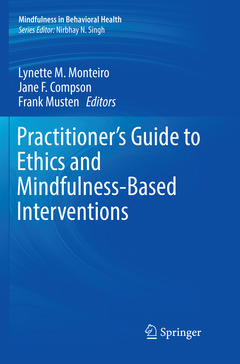Practitioner's Guide to Ethics and Mindfulness-Based Interventions , Softcover reprint of the original 1st ed. 2017 Mindfulness in Behavioral Health Series
Coordonnateurs : Monteiro Lynette M., Compson Jane F., Musten Frank

Focuses on the role of ethics in clinical mindfulness-based interventions (MBIs)
Reviews current training processes and issues related to cultivating an embodied ethics-based mindfulness in clinicians
Explores ways in which ethics have been successfully embedded into MBI training curricula
Examines the role of ethics for clinicians when working with specific populations, including corporations, the military, and schools
Includes supplementary material: sn.pub/extras
Date de parution : 06-2018
Ouvrage de 418 p.
15.5x23.5 cm
Date de parution : 11-2017
Ouvrage de 418 p.
15.5x23.5 cm
Disponible chez l'éditeur (délai d'approvisionnement : 15 jours).
Prix indicatif 179,34 €
Ajouter au panierThème de Practitioner's Guide to Ethics and Mindfulness-Based... :
Mots-clés :
Buddhism, ethics, and mindfulness interventions, Clinical applications and mindfulness, Compassion and mindfulness-based interventions, Compassion and ethics in mindfulness interventions, Corporations and mindfulness, Education and mindfulness, Embodied ethics and mindfulness training, Ethics and mindfulness curriculum, Ethics and mindfulness interventions, Informed consent and MBIs, Medical professionals and empathy, Military uses of mindfulness, Mindfulness interventions in schools, Morality and mindfulness interventions, Psychotherapy and mindfulness-based interventions, Therapeutic training and mindfulness, Training clinicians in MBIs, Value-neutrality in therapeutic models
Ces ouvrages sont susceptibles de vous intéresser

Buddhist Foundations of Mindfulness 105,49 €


